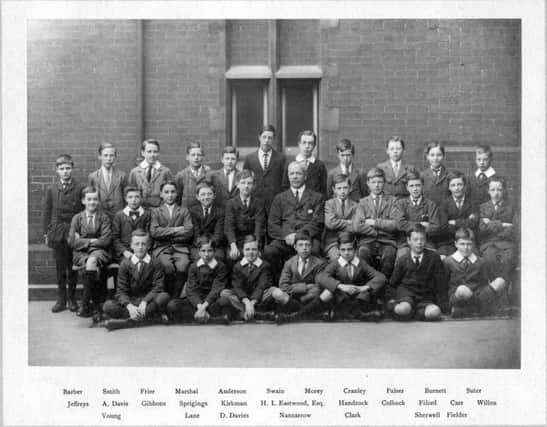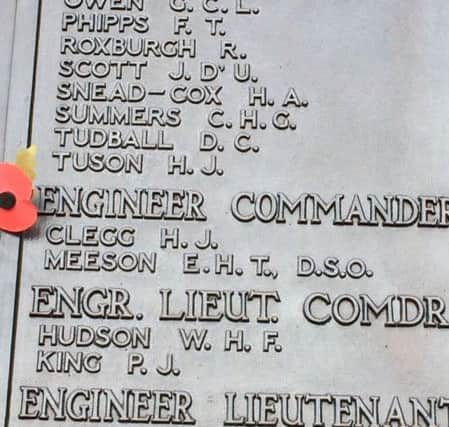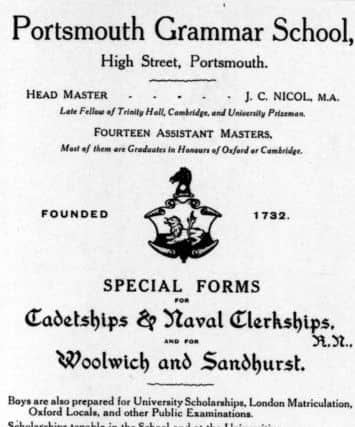Five Portsmouth Grammar School pupils killed at the Battle of Jutland


They included Major Francis Harvey who was posthumously awarded the Victoria Cross and whose story was featured here yesterday.
Four other former pupils were killed shortly after Harvey died saving his ship, HMS Lion.
Advertisement
Hide AdAdvertisement
Hide AdAt Prizegiving in 1883, 13-year-old Hubert Clegg was presented with a copy of Lives of British Admirals in recognition of his achievement of coming top in the French class.


At the age of 20 he joined the Royal Navy as an assistant engineering officer. Two minutes after HMS Lion was hit, Hubert was one of 1,017 men who were killed in an instant when the magazine of HMS Indefatigable exploded after being shelled. There were only two survivors.
At Prizegiving in 1891, 15-year-old Charles Harvey was presented with a copy of Wilmot’s Development of Navies in recognition of coming second, overall, in his class.
At the age of 18 he joined the Royal Navy as an assistant clerk.
Advertisement
Hide AdAdvertisement
Hide AdTwenty-three minutes after HMS Indefatigable was sunk, Charles was one of 1,266 men who were killed when HMS Queen Mary was hit and its magazine exploded.


In 1915, Thomas Wood-Robinson was awarded a Royal Humane Society medal for diving into rough seas in the north of Scotland in an attempt to save a man who had been swept overboard.
But the navy was not Thomas’s first choice of career. He had joined Middlesex Hospital straight from school and, one month before war was declared, qualified to be a member of the Royal College of Surgeons. He immediately offered his services to the Admiralty and, in 1915, joined the navy as a temporary surgeon.
He was serving in HMS Black Prince when she was sunk at the end of the first day of Jutland with the loss of the entire ship’s company of 857 men.
Advertisement
Hide AdAdvertisement
Hide AdReginald Hines’ only prize was the applause he received at annual school concerts where he bravely sang solo.


In his final year at PGS in 1898 his rendering of The Toast of the Dandy Fifth, a military song, was well-received.
In the early hours of the morning, on the second day of the Battle of Jutland, his ship HMS Turbulent was sunk with the loss of 90 of its company of 103.
A few weeks after the battle, the school magazine reported that a large iron plate from HMS Warspite, pierced by a shell during the fighting, had been received and put on display in the school.
Advertisement
Hide AdAdvertisement
Hide AdElsewhere, in the same edition, the casualty lists appeared, with the names of the dead and the wounded, lists that were to be added to in the coming months as the smoke cleared and the carnage of the Battle of the Somme mounted.


The outcome of the Battle of Jutland, the one great naval battle of the First World War, was unclear, but both sides claimed to be the winner.
The editor of the school magazine reflected the stated views of Britain’s leaders and press. ‘The first news was of a depressing character, but as the details came to hand, we found that the battle, which we had at first thought was almost a defeat, was really a great victory.’
The Royal Navy had lost more ships and more than double the number of men than the Imperial German navy, but the German fleet was never again in a position to put to sea and challenge the British in the North Sea.
Advertisement
Hide AdAdvertisement
Hide Adn With thanks to Portsmouth historian and author John Sadden, the archivist at Portsmouth Grammar School.
n Read more about the role of local people in the First World War in our fascinating book Portsmouth And The Great War now available for only £4.75 (inc postage and packing).
Discover how Portsmouth raised three battalions to help defend the nation, how news of the Battle of Jutland was received and see if your ancestors were included in the Roll of Honour.
Call (023) 9262 2752 to order your copy.